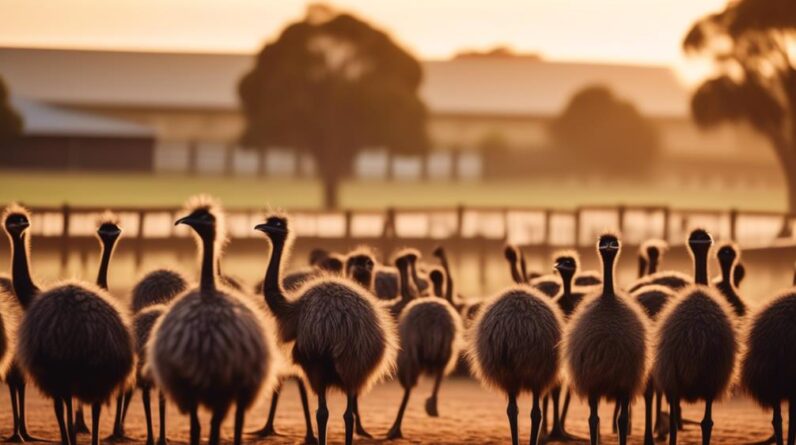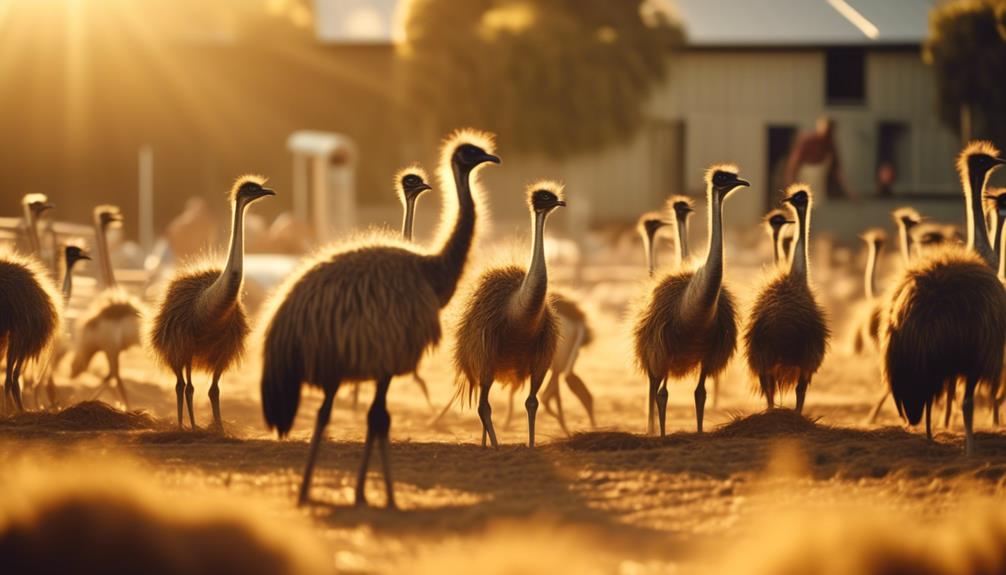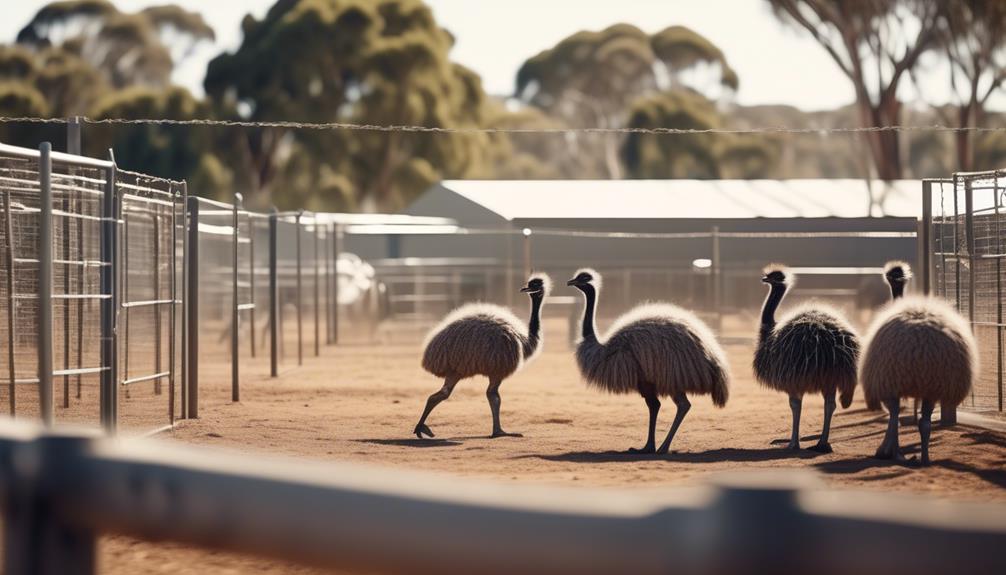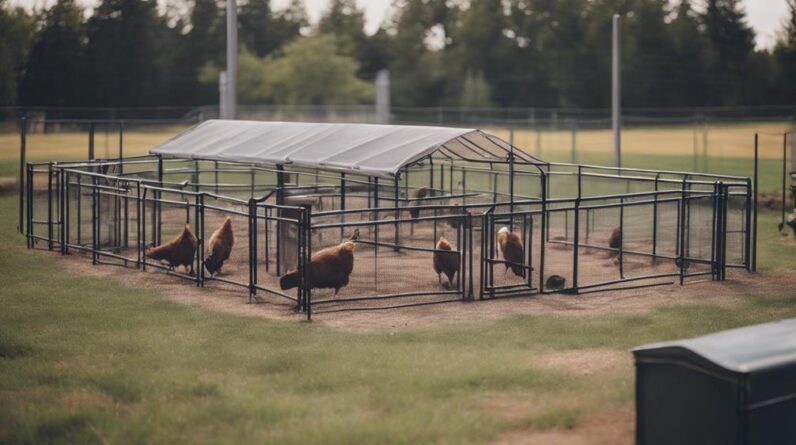
So you've decided to dip your toes into the world of emu farming, huh? Well, you've come to the right place. Emu farming may seem like an unconventional choice, but trust us, it's a venture that holds immense potential.
In this comprehensive starter guide, we'll walk you through everything you need to know to get started on your emu farming journey. From understanding the behavior and needs of these fascinating creatures to setting up the perfect infrastructure, from selecting and purchasing the right emus to ensuring their proper nutrition and health care, we've got you covered.
But that's not all – we'll also delve into the intricacies of breeding and reproduction for aspiring emu farmers, and we'll shed light on the art of marketing and selling emu products.
So, strap in and get ready to embark on an exciting and rewarding adventure in the world of emu farming. You won't regret it.
Why Choose Emu Farming?

There are several compelling reasons why you should consider choosing emu farming as a lucrative and rewarding venture. Emu farming offers numerous advantages and has proven to be highly profitable for many farmers.
One of the main advantages of emu farming is the low investment required to get started. Compared to other livestock ventures, such as cattle or poultry farming, the initial investment for emu farming is relatively low. This makes it an ideal choice for beginners or farmers with limited capital.
Another advantage of emu farming is the high profitability potential. Emu products, such as meat, oil, and feathers, are in high demand and can fetch premium prices in the market. Emu meat is known for its low fat content and nutritional value, making it a popular choice among health-conscious consumers. Emu oil is also highly sought after for its medicinal properties and is used in various cosmetic and pharmaceutical products. Additionally, emu feathers are used in the fashion industry for their unique texture and appearance.
Moreover, emus are known for their adaptability and resilience. They can withstand harsh weather conditions and are disease-resistant, which reduces the risk of losses due to illness. Emus are also known to have a high reproductive rate, with females laying around 30-50 eggs per year. This further contributes to the profitability of emu farming.
Understanding Emu Behavior and Needs
To fully capitalize on the advantages of emu farming, it's crucial for beginners to have a deep understanding of emu behavior and their specific needs. Emus are social animals that thrive in a group setting, so providing them with appropriate socialization opportunities is essential.
Here are some key points to consider:
- Emu socialization:
- Emus are highly social creatures and prefer to live in small groups or pairs.
- They establish a social hierarchy within their group, with dominant birds asserting their authority.
- Social interaction helps reduce stress and promotes overall well-being in emus.
- Emu habitat requirements:
- Emus require a spacious and secure enclosure, as they're large, flightless birds that need room to roam.
- The enclosure should have sturdy fencing to prevent escapes and keep predators out.
- Emus also need access to shade, as they're susceptible to overheating in hot weather.
Understanding these aspects of emu behavior and their habitat requirements will enable you to create an environment that promotes their physical and mental well-being. By providing a suitable social structure and a spacious, secure habitat, you'll ensure that your emus lead happy and healthy lives on your farm.
Setting Up Your Emu Farm Infrastructure

When setting up your emu farm infrastructure, it's crucial to carefully plan and design the facilities to meet the specific needs of your emus and ensure their well-being and productivity.
The layout of your emu farm plays a critical role in maximizing efficiency and minimizing stress for your emus. Start by dividing your farm into separate areas for breeding, incubation, rearing, and adult emus. This allows you to create distinct environments tailored to each stage of their life cycle. Additionally, consider the natural behavior of emus and provide ample space for them to roam and exercise. Emus are curious creatures, so incorporating various natural features like ponds, trees, and shrubs into their habitat can enhance their well-being.
Equally important is the selection of suitable emu farm equipment. Invest in sturdy fencing to secure your emu enclosures and prevent escapes or predator attacks. Emus require shelter from extreme weather conditions, so provide sturdy and well-insulated shelters for them to seek refuge. Watering systems with automatic fillers and temperature-controlled heating elements are essential for their hydration and comfort throughout the year. Feeders should be designed to prevent wastage and facilitate easy access for emus of all sizes.
Selecting and Purchasing Emus
As an experienced emu farmer, selecting and purchasing emus is a crucial step in ensuring the success and profitability of your farm. To make informed decisions, consider the following factors:
- Emu breed selection:
- Evaluate the purpose of your farm. If you aim to produce meat, the Large Gray or the Black Emu are ideal choices due to their size and meat quality.
- For feather production, the Blonde or White Emu breeds are more suitable, as they've a higher feather-to-body ratio.
- If you're interested in both meat and feather production, the Red or Royal Emus are versatile options to consider.
- Emu farm location considerations:
- Climate plays a vital role. Emus thrive in areas with a temperate climate, as extreme heat or cold can be detrimental to their health.
- Access to water sources is crucial. Emus require ample drinking water and the availability of ponds or water bodies nearby is beneficial.
- Consider proximity to markets and transportation. Select a location that allows for convenient transportation of your emus and their products.
Feeding and Nutrition for Healthy Emus

Feeding and nutrition are crucial aspects of maintaining the health and well-being of your emus on the farm. To ensure your emus stay healthy and productive, it's important to understand their feeding schedule and dietary requirements.
Emus have specific dietary needs that must be met for optimal growth and development. Their diet primarily consists of grasses, seeds, fruits, and vegetables. It's important to provide them with a balanced diet that includes a variety of these food sources.
Emus should be fed twice a day, in the morning and evening, to ensure they receive enough nutrients. Their feeding schedule should be consistent, with regular meal times to establish a routine. Adequate water should always be available to them, as emus require plenty of hydration.
To meet their dietary requirements, emus can be fed a combination of commercial emu feed and fresh produce. Commercial emu feed is specially formulated to provide the necessary vitamins and minerals that emus need. However, it should be supplemented with fresh fruits and vegetables to ensure a well-rounded diet.
Emu Health Care and Disease Prevention
To ensure the continued health and well-being of your emus, it's essential to prioritize their care and take proactive measures to prevent disease outbreaks. Emus, like any other livestock, are susceptible to various diseases that can have a devastating impact on their overall health.
By following a proper emu vaccination schedule and implementing effective disease prevention strategies, you can significantly reduce the risk of illness in your flock. Here are three key steps to keep your emus healthy:
- Vaccination: Emus require specific vaccinations to protect them from common diseases. Consult with a veterinarian experienced in emu health to determine the appropriate vaccination schedule for your flock. Vaccines can prevent diseases such as avian influenza, Newcastle disease, and salmonellosis.
- Biosecurity Measures: Implementing stringent biosecurity measures is crucial to prevent the introduction and spread of diseases. This includes controlling access to your farm, quarantining new birds, regularly disinfecting equipment and facilities, and practicing proper waste management.
- Regular Health Checks: Conduct regular health checks to monitor the well-being of your emus. This includes observing their behavior, checking for signs of illness, and maintaining a clean and hygienic environment. Promptly address any signs of illness by seeking veterinary advice and implementing appropriate treatment measures.
Breeding and Reproduction for Emu Farmers

Breeding and reproduction play a crucial role in the success and growth of your emu farming operation. To ensure a healthy and sustainable emu population, understanding the proper techniques for emu breeding and emu egg incubation is essential.
When it comes to emu breeding, it's important to have a ratio of one male to every three to five females. This will help maintain a balanced breeding environment and increase the chances of successful reproduction. Emus typically reach sexual maturity at around two to three years of age, and their breeding season usually occurs during the warmer months.
To encourage successful breeding, it's recommended to provide a suitable nesting area for the emus. This can be a simple sheltered spot with soft bedding materials, such as straw or hay. Emus are known to lay large green eggs, and it's crucial to handle them with care during collection.
The eggs should be incubated at a temperature of around 97 to 99 degrees Fahrenheit for approximately 50 to 55 days. Proper humidity levels should also be maintained throughout the incubation period.
Marketing and Selling Emu Products
Once you have successfully bred and incubated your emu eggs, it's time to focus on the next important aspect of your emu farming operation: marketing and selling your emu products. This stage is crucial for the success and profitability of your business.
To effectively market and sell your emu products, consider the following strategies:
- Develop Emu Product Recipes:
- Experiment with creating various emu product recipes, such as emu meat cuts, sausages, and burgers.
- Incorporate different flavors and seasonings to cater to diverse consumer preferences.
- Document and refine your recipes to ensure consistency in taste and quality.
- Effective Online Marketing Strategies:
- Build a professional website to showcase your emu products and provide information on their benefits and nutritional value.
- Utilize social media platforms to engage with your target audience and promote your emu products.
- Collaborate with influencers or bloggers in the health and wellness industry to endorse and review your emu products.
- Establish Partnerships with Local Retailers:
- Approach local grocery stores, health food stores, and specialty shops to stock your emu products.
- Offer samples and demonstrations to educate retailers and consumers about the unique qualities of emu products.
- Provide marketing materials and in-store signage to highlight the health benefits and versatility of emu products.
Frequently Asked Questions
How Long Do Emus Typically Live?
Emus, like any living creatures, have a lifespan that can be influenced by various factors. Understanding the average emu lifespan and the elements that affect it is crucial for anyone looking to venture into emu farming.
Are There Any Legal Requirements or Regulations for Starting an Emu Farm?
Before starting an emu farm, it's crucial to understand the legal requirements and regulations you'll need to comply with. This includes obtaining permits, certifications, and insurance coverage, as well as adhering to zoning regulations.
Can Emus Be Trained or Domesticated?
Emus can be trained and domesticated. Some interesting statistics show that with proper emu training techniques, success stories of emu domestication have been reported. It requires patience, consistency, and a deep understanding of their behavior.
What Are Some Common Challenges or Obstacles Faced by Emu Farmers?
When it comes to emu farming, you'll encounter common challenges and obstacles. Achieving financial sustainability is a priority, along with effective predator control. These aspects demand careful planning, expertise, and perseverance.
Are There Any Specific Certifications or Training Programs Available for Emu Farming?
There are various certifications and training programs available for aspiring emu farmers. These resources provide knowledge, skills, and techniques to overcome challenges and achieve success. Benefits include networking opportunities and access to success stories from experienced emu farmers.
Conclusion
Congratulations! You have now become the master of emu farming. You have successfully navigated through the intricacies of their behavior, set up a top-notch infrastructure, and carefully selected and nourished your emus. You have also taken the necessary steps to ensure their health and well-being.
With your knowledge and expertise, you are now ready to conquer the market and sell your top-quality emu products. Embrace this new journey with confidence, as you embark on the path to success in the world of emu farming.





